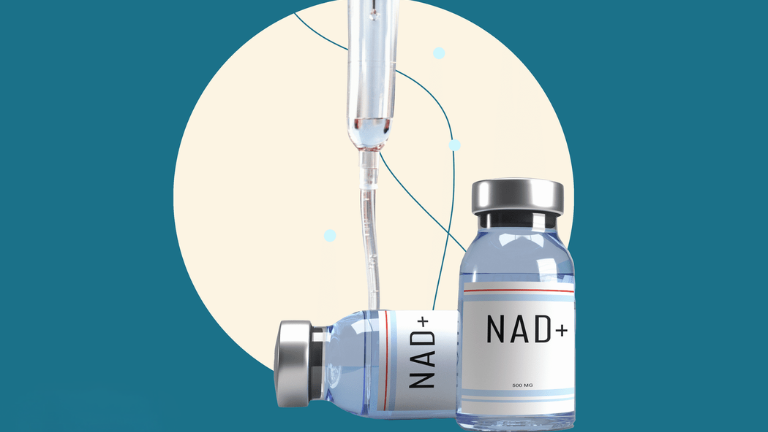NAD+ Infusions: Anti-Aging Breakthrough or Overhyped Wellness Trend?
The Rise of NAD+ in the Anti-Aging Industry
In the ever-evolving world of health and longevity, a new trend has emerged—NAD+ infusions. Celebrities, wellness influencers, and even medical experts are buzzing about its potential to boost energy, improve brain function, and even slow down aging.
High-profile figures such as Hailey Bieber, Kendall Jenner, and Jennifer Aniston have embraced NAD+ IV therapy, touting its rejuvenating effects. From luxury wellness spas to elite longevity clinics, NAD+ infusions are being marketed as the ultimate anti-aging solution.
But does the science back up these claims? Or is NAD+ just another overpriced wellness fad? Let’s take a closer look.
What Is NAD+ and Why Does It Matter?
NAD+ (Nicotinamide Adenine Dinucleotide) is a coenzyme that plays a critical role in our body’s energy production, cellular repair, and metabolism. It’s found in every living cell and is essential for:
✅ Energy Production – Supports mitochondrial function, which fuels our cells.
✅ DNA Repair – Helps fix damaged DNA, slowing down cellular aging.
✅ Brain Function – Enhances cognitive performance and memory.
✅ Inflammation Control – Activates sirtuins, proteins linked to longevity and stress resistance.
As we age, NAD+ levels naturally decline, leading to fatigue, cognitive decline, muscle loss, and increased susceptibility to disease. This has led scientists to investigate whether boosting NAD+ levels could reverse or slow down these aging-related issues.
The Science Behind NAD+ and Aging
Dr. Shinichiro Imai, a professor at Washington University School of Medicine, has spent years studying the connection between NAD+ and aging. In a landmark study, Imai and his team discovered that NAD+ levels decrease significantly with age, which could contribute to energy loss and cellular dysfunction.
This research opened the door to exploring NAD+ supplementation as a way to counteract aging. Animal studies have shown promising results—mice given NAD+ precursors displayed increased lifespan, improved muscle function, and enhanced cognitive abilities.
However, when it comes to human applications, research is still in its early stages. Scientists like Dr. Charalampos Tzoulis, a neurologist at the University of Bergen, are conducting clinical trials to determine whether NAD+ supplements can benefit individuals with neurodegenerative diseases like Parkinson’s. His early findings showed that Parkinson’s patients experienced a modest but significant improvement in symptoms after NAD+ supplementation.
While these results are encouraging, experts caution that NAD+ research is far from conclusive—especially when it comes to general anti-aging claims.
NAD+ IV Infusions: Do They Really Work?
One of the biggest controversies surrounding NAD+ therapy is the effectiveness of IV infusions. Wellness clinics and high-end spas charge anywhere from $900 to $1,300 per session, promising instant energy boosts, mental clarity, and anti-aging benefits.
However, according to medical experts, these claims may not be scientifically justified.
Dr. Michael Sagner, founder of the European Society of Preventive Medicine, argues that NAD+ IV drips are largely ineffective. “There is no biological transporter that allows NAD+ molecules to enter cells directly through an IV,” he explains.
Dr. Eric Verdin, CEO of the Buck Institute for Research on Aging, agrees, stating that the perceived benefits of NAD+ IV therapy could simply be a placebo effect.
In simple terms, NAD+ infusions might not work the way people think they do. Despite their popularity among celebrities and influencers, there is little clinical evidence to support IV-based NAD+ treatments for anti-aging.
How to Boost NAD+ Naturally
If IV infusions don’t work, what are the best ways to naturally increase NAD+ levels?
✅ Eat NAD+ Rich Foods – Foods like edamame, avocado, salmon, and mushrooms contain NAD+ precursors that help replenish cellular levels.
✅ Exercise Regularly – Studies show that physical activity can naturally increase NAD+ production.
✅ NAD+ Supplements – Pills containing nicotinamide riboside (NR) or nicotinamide mononucleotide (NMN) can help the body produce NAD+ more efficiently.
✅ Get Enough Sleep – Quality sleep is essential for maintaining NAD+ levels and supporting mitochondrial health.
Several brands, including Elysium Health, Thorne, and Renue, sell NAD+ precursor supplements, but it’s important to note that none of these products are FDA-approved. While they might help boost cellular NAD+ levels, more research is needed to confirm their long-term benefits and safety.
The Future of NAD+ Research
The growing interest in NAD+ as an anti-aging solution has led to an increasing number of clinical trials and scientific studies. Dr. Tzoulis’ team is currently conducting a large-scale trial with 400 Parkinson’s patients, with results expected later this year.
If these findings confirm that NAD+ supplementation can improve neurological function, it could open the door for further studies on whether NAD+ can help prevent neurodegenerative diseases and slow down aging.
However, some researchers, like Dr. Verdin, believe that simply replenishing NAD+ levels may not be the ultimate solution. Instead, scientists should focus on understanding why NAD+ declines with age and how to prevent or reverse this depletion naturally.
Is NAD+ Worth the Hype?
So, is NAD+ truly an anti-aging breakthrough, or is it just another overhyped wellness trend?
🔹 What We Know:
- NAD+ is essential for cellular function and energy metabolism.
- Its levels decline with age, contributing to fatigue, cognitive decline, and other aging-related issues.
- Scientific research suggests NAD+ supplementation may have potential benefits, particularly in neurodegenerative diseases.
🔹 What We Don’t Know:
- There is no conclusive evidence that NAD+ infusions reverse aging in healthy individuals.
- IV infusions are largely ineffective, as NAD+ cannot enter cells directly.
- More clinical trials are needed before recommending NAD+ supplements for general use.
Final Verdict
If you’re considering NAD+ supplementation, opt for natural methods like diet, exercise, and oral NAD+ precursors rather than spending thousands on IV treatments with little scientific backing.
While NAD+ research holds great promise, it’s still in its early stages. If clinical trials prove its effectiveness, NAD+ could become one of the most powerful tools in longevity science.
But until then, the best anti-aging advice remains the same: eat well, exercise regularly, sleep enough, and manage stress.
Would you try NAD+ supplements? Or do you think it’s just another wellness fad? Let us know in the comments!







